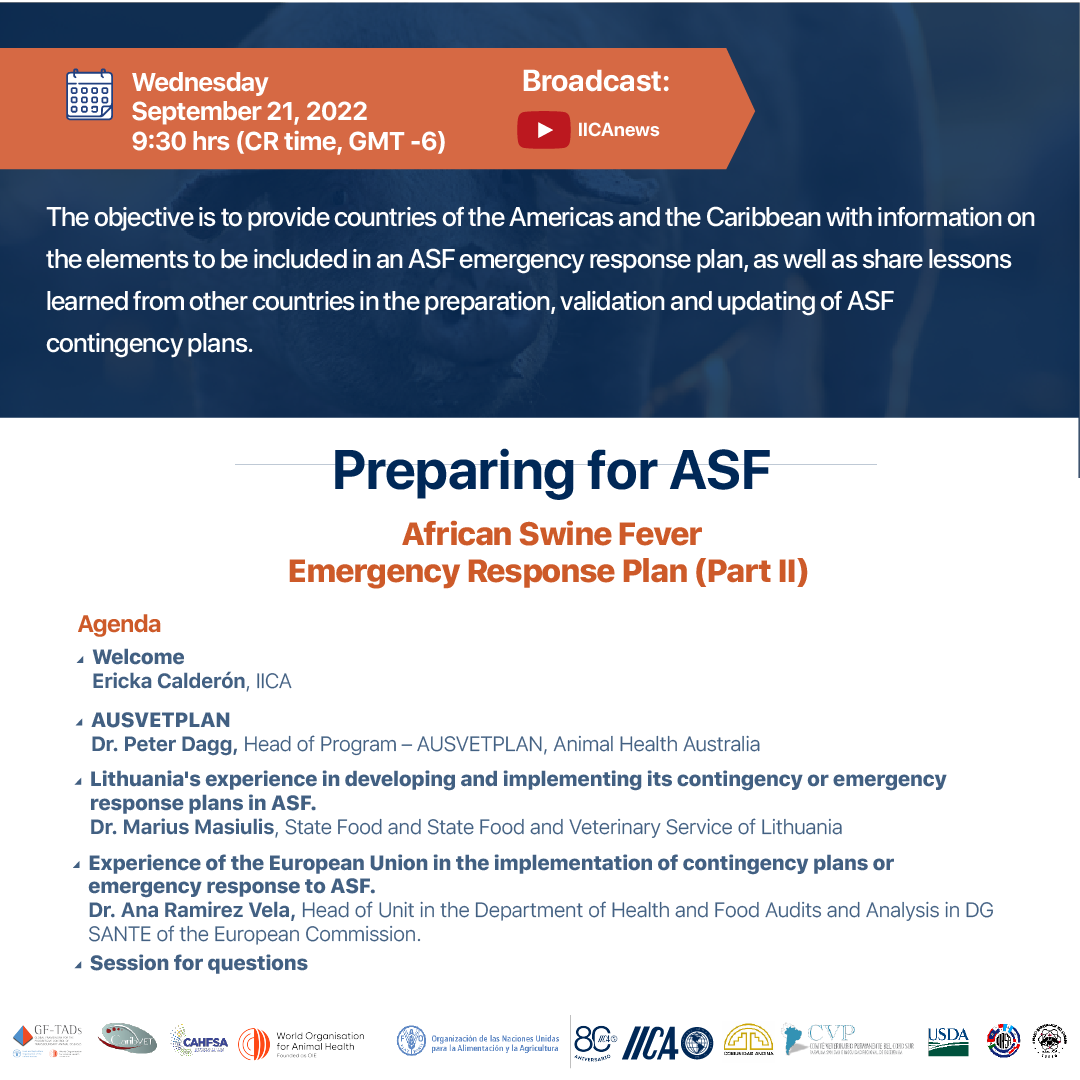
The webinar provides countries of the Americas and the Caribbean with information on the elements to be included in an ASF emergency response plan, as well as share lessons learned from other countries in the preparation, validation and updating of ASF contingency plans.
Lithuania’s experience in the development and implementation of ASF contingency or emergency response plans. Dr. Marius Masiulis, State Food and Veterinary Service of Lithuania
AUSVETPLAN, Dr. Peter Dagg, Head of the AUSVETPLAN Program, Animal Health Australia
The European Union’s experience in the implementation of ASF contingency or emergency response plans. Dr. Ana Ramírez Vela, Head of Unit of the Directorate of Health and Food Audits and Analysis at the Directorate-General for Health and Food Safety (DG SANTE) of the European Commission
Ana Ramírez
Spanish veterinarian with a Master’s degree in Project Management.
She has cooperated in development projects and has experience as a clinical veterinarian and public health technician.
She has worked at the European Commission since 2003, first as an inspector/auditor in various areas (food hygiene, animal health and import controls) and later as an officer and manager for Europe’s animal welfare policy.
She currently serves as Head of Unit of the Directorate of Health and Food Audits and Analysis (located in Ireland) at the Directorate-General for Health and Food Safety (DG SANTE) of the European Commission. Her unit oversees primary production and animal health and welfare.
Peter Dagg
Head of the AUSVETPLAN Program, Animal Health Australia.
A veterinarian, Peter has worked for the Australian government and in the private sector in the fields of national animal health and welfare, biosecurity, import risk analysis, food safety and veterinary public health. He has also been involved in animal disease preparedness and response planning for over 15 years, playing a key role during the 2007 Australian equine influenza outbreak and the 2009 H1N1 human influenza pandemic. Peter is passionate about applying practical science-based solutions to the emergency animal disease response policy, in order to ensure that no time is wasted in preparing responses to disease outbreaks.
Dr. Marius Masiulis
After completing veterinary studies, he obtained a Ph.D. in Animal Breeding. In 2008, he began working at the State Food and Veterinary Service of Lithuania as the Deputy Chief of the Department of Animal Health and Welfare. After 4 years, he transferred to the Emergency Response Department, which he continues to lead to this date. As Head of the Emergency Response Division, he coordinates the control of contagious animal diseases, oversees the drafting and updating of national contingency plans, and is actively involved in drafting legislation on animal disease control measures, including biosafety requirements for pig breeders and hunters. Throughout his career, he has been involved in the eradication of Classical Swine Fever (in 2009 and 2011) and in the surveillance, control and eradication of ASF in domestic pigs and wild boar since 2014.
He has participated in various training sessions, workshops and online courses related to ASF, and forms part of different working groups and scientific committees. He has delivered training on African swine fever to private veterinarians, officials, hunters and pig farmers. For 11 months, he served as a Contingency Planning Officer for the European Commission for the Control of Foot and Mouth Disease at the Food and Agriculture Organization of the United Nations in Rome, Italy.



